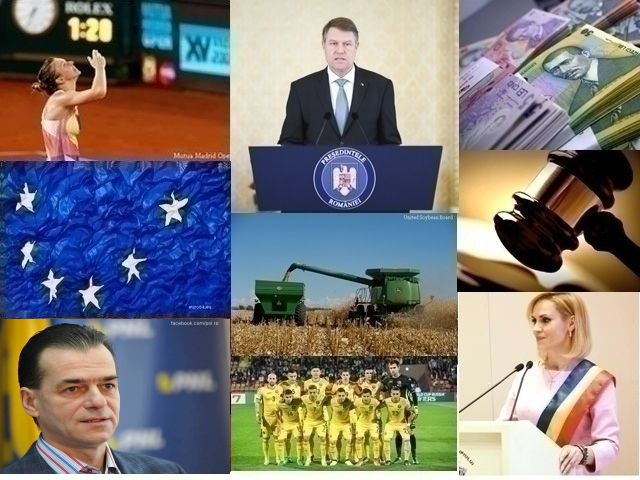January 6-10
A roundup of the week's top stories

România Internațional, 11.01.2020, 14:00
Prime Minister Ludovic Orban on a
visit to Brussels
Upon his first official visit to
Brussels since his Government took office last November, Prime Minister Ludovic
Orban met with several high-ranking EU and NATO officials over the course of
the three-day visit. Prime Minister Orban and NATO Secretary General Jens
Stoltenberg on Thursday discussed, among other things, cooperation within NATO,
the developments in the Middle East and security in the Black Sea region. Secretary
Stoltenberg hailed Romania’s contribution to the training mission in Iraq, stating
NATO has the possibility of doing more in the Middle East, just as President
Donald Trump has asked. Ludovic Orban said the North Atlantic Treaty Alliance
is a major partner of Romania, reiterating Bucharest’s full support for the
fulfillment of the organization’s goals. The Romanian Prime Minister said
Romania would continue to take part in NATO missions and initiatives concerning
NATO’s advanced presence on its eastern flank, as well as in Afghanistan,
Kosovo and Iraq. Secretary Stoltenberg hailed Romania’s efforts to earmark 2%
of its GDP to defense spending, pointing out the Black Sea region is of
strategic importance to NATO. Also in Brussels, Prime Minister Orban met with
the European Council President, Charles Michel, saying Romania would promote
the EU’s strategic agenda, which is bound to protect citizens and liberties and
build a green, equitable and climate-neutral Europe, as well as help promote European
values and interests at global level. Orban subsequently had talks with the EU
Chief negotiator for Brexit, Michel Barnier, both highlighting the importance
of the agreement struck with Great Britain regarding its withdrawal, especially
in terms of protecting citizens’ rights. During his meeting with European
Parliament President, David Sassoli, Ludovic Orban reiterated Romania’s plea to
join the Schengen Area, an objective supported by the European Parliament.
Talks also focused on negotiations over the upcoming multiannual financial framework
and the European Ecological Pact. Orban expressed concern over the possible
negative consequences the implementation of the Green Pact would have on the
competitiveness of European companies. Measures to reform the Romanian
judiciary as well as Bucharest’s economic policies were high on the agenda for
talks with the European Commission President, Ursula von der Leyen. The two
also tackled topics pertaining to the future of Europe. Romania is a serious,
responsible partner committed to attaining EU goals and implementing
regulations adopted by community institutions, Romania’s Prime Minister Ludovic
Orban said. The EU is Romania’s ally as it prepares for the digital era,
relying on Bucharest’s support, which enjoys an outstanding reputation in this
field, the EU official said in turn.
Romania and the developments in the
Middle East
The headline-grabbing event this week
was the US-Iran crisis, triggered by the killing of Iranian General Qassem Soleimani,
the commander of the Islamic Revolutionary Guard Corps. In retaliation, Teheran
launched missile attacks on US military bases in Iraq. The attacks have outraged
the international community, including Romania, which decided to temporarily
relocate its 14 military deployed to Iraq. Bucharest authorities have called
for a calm and diplomatic solution to the crisis. Foreign Minister Bogdan
Aurescu:
Romania firmly reiterates its call
for the de-escalation of tensions. Our Romanian military part of the anti-DAESH
international coalition haven’t been affected, which is good news. Also,
considering some of the missiles targeted the Erbil region, which is home to some
180 Romanian citizens, our General Consulate in Erbil has confirmed the absence
of any casualties.
In turn, president Klaus Iohannis
called for a larger implication of NATO in the Middle East, both in terms of
security and reconstruction, the latter being to Romania’s particular interest.
President Iohannis said the latest developments in the Middle East might impact
Europe’s security as well, not just the actors involved. The President said
Romania is in permanent contact with its European and NATO partners, especially
the United States, and that our country supports the integrity, unity and
sovereignty of Iraq. Klaus Iohannis said the fight against terrorism should continue,
calling on the sides involved to resume dialogue and observe their pledged
commitments.
The President pays an official visit to Bavaria
On Tuesday the Romanian President
Klaus Iohannis paid a working visit to the State of Bavaria where he attended a
meeting of the local government. The Romanian head of state met with the prime
minister of Bavaria, Markus Söder, who is the president of the Christian Social
Union (CSU). The two discussed bilateral relations as well as European issues
such as the upcoming multiannual financial framework of the EU, Brexit and the
migration policy. Klaus Iohannis promised Romania will get involved alongside
the other member states to make the EU stronger and more united. Romania is
still waiting for the go-ahead for our country’s Schengen accession, without
which the travel-free area cannot fully function, the President told MPs from
the Christian Social Union. On the other hand, Klaus Iohannis launched a plea
for unity, cohesion and solidarity in efforts to consolidate the European
project. President Iohannis also said the EU’s top priority should be achieving
an undivided Europe that should bring Member States more convergence and
equity, with tangible benefits to its citizens.
(Translated by V. Palcu)



























